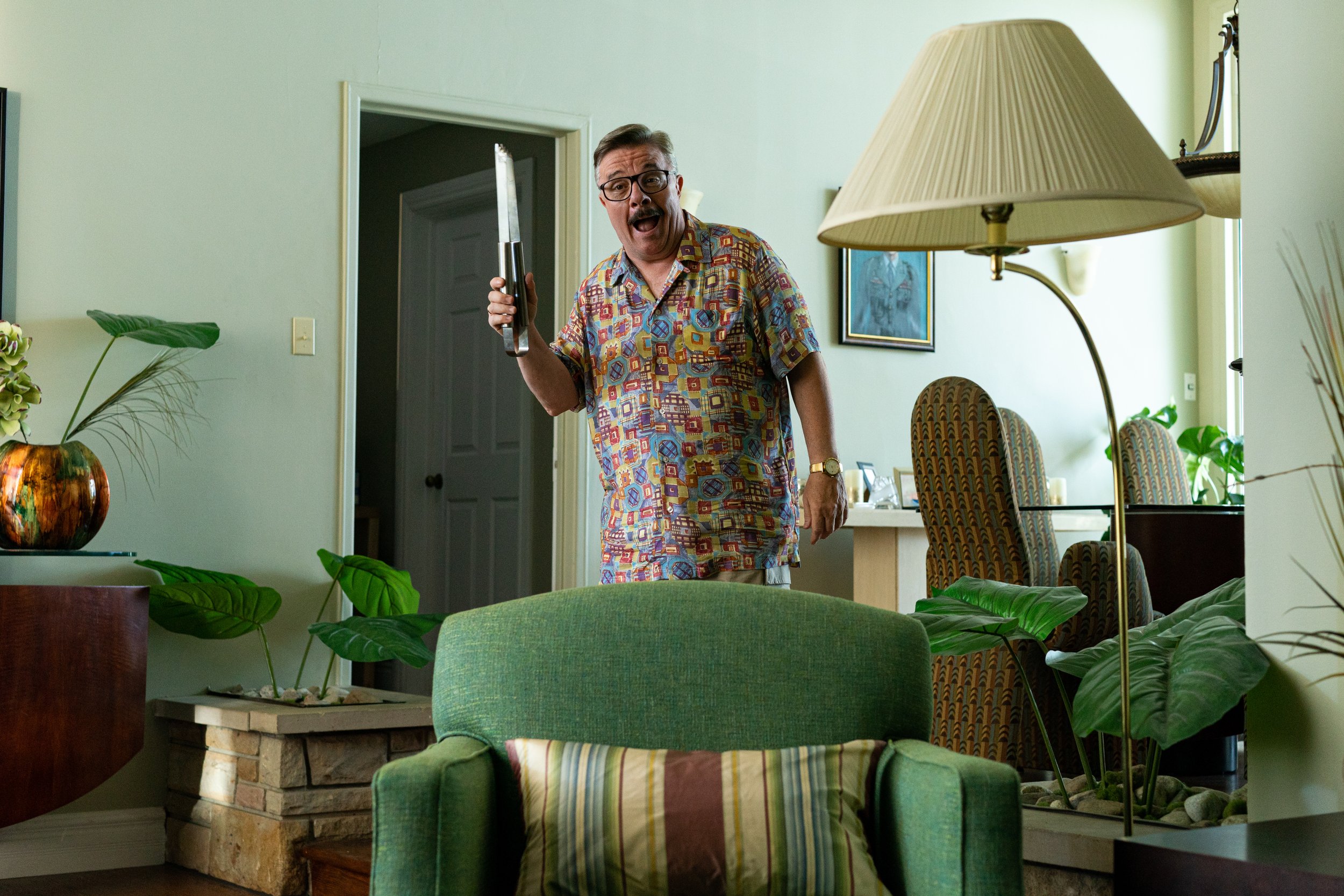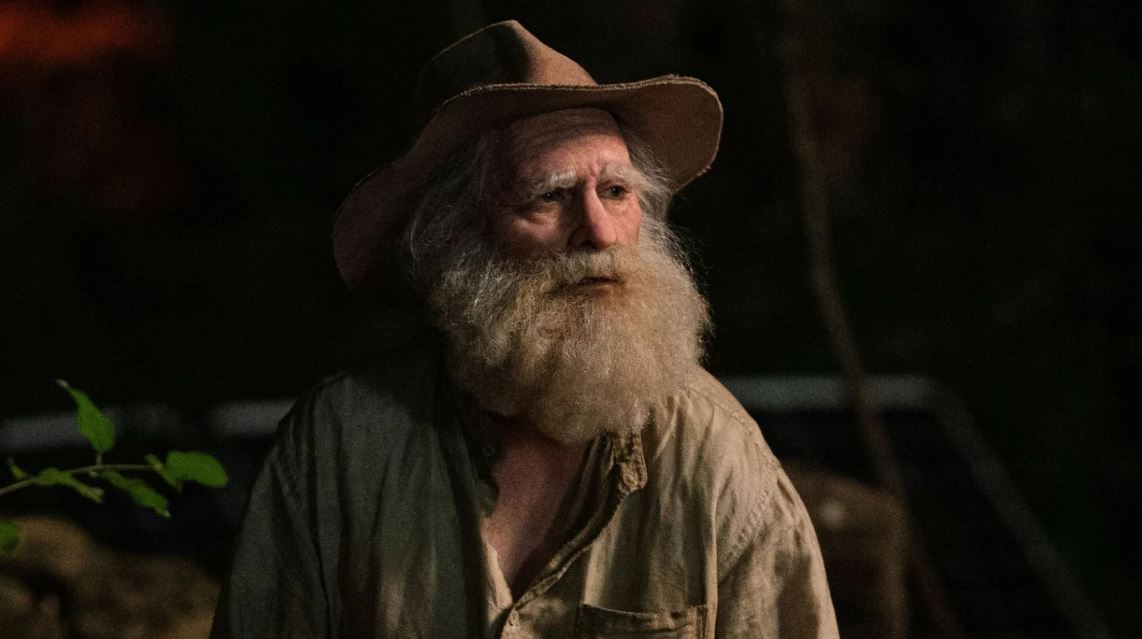Anyone who’s seen Hereditary or Midsommar knows that no traditional cinematic package can contain the themes and stupendous ambitions of writer-director Ari Aster. The trouble with his newest film, Beau is Afraid – other than its title – is that there is no package. This is a messy, shambolic stumble through imagery and preoccupations that recognisably originate in Aster’s brain, where the centre does not hold. Really, there is no centre – unless you want to consider it the largest collection of free associative mummy issues ever assembled.
You can look at Beau is Afraid from certain angles and perceive something good. Beau Wasserman, the film’s central character played by Joaquin Phoenix, is a Charlie Kaufman character if ever there was one. A stammering mass of thinning hair and overdeveloped insecurities, Beau might well have been the protagonist of 2020’s I’m Thinking of Ending Things, an example of how this sort of surrealism goes right. Look from another angle and you’ll see a chaotic and highly symbolic descent into madness like Darren Aronofsky’s mother!, bursting with black comedy as it builds toward an apocalyptic fever pitch.
You may have to be in the right headspace to appreciate either of those films, but if you are, a clarity of purpose shines through, forgiving all faults. That doesn’t happen in Beau is Afraid. It proceeds from a really rewarding opening 45 minutes or so, to a less engaging 45-minute section that still holds your attention with an optimistic expectancy of where things might go. The final two 45-minute segments continue to erode a viewer’s good will until the movie is finally left wallowing in its own confusion. And yes, you’ve done the maths correctly in your head: Beau is Afraid is two hours and 59 minutes long.
It’s no wonder Aster’s follow-up to Midsommar has been shelved for a while, missing its original 2022 release date and undergoing a title change from Disappointment Blvd. The movie defies any conventional marketing strategies, not only because of its length but because it is also not precisely a horror movie, like Aster’s first two films. The movie itself is a disappointment, but not because Aster can or should only make horror. Rather, it’s because he’s been overwhelmed by his creative freedom, rendering something that is spectacularly odd from moment to moment but in the final analysis lands with a thud.
Of the four fairly distinct sections of the film, probably only the first should be given any sort of traditional plot synopsis, both because it’s part of Aster’s intention not to telegraph where the film is going, and because it would sound insane in the banal contours of a plot synopsis. Beau starts in a session with this therapist (Stephen McKinley Henderson), who prescribes him a new drug and asks him about an upcoming trip to see his mother on the anniversary of his father’s death. (It wouldn’t be Aster without untimely deaths of parents factoring in.)
As his trip approaches, Beau begins receiving notes under his door from an unseen neighbour, asking him to turn his music down – even though he’s not playing any music. When it’s time to depart, he goes back for his dental floss and finds his bag stolen and his only set of keys removed from where it was dangling in his lock. This might be expected behaviour for this neighbourhood – the streets below his apartment are a literal hellscape of dangerous hoodlums, drug addicts, homeless people and the insane – but his apartment building itself has typically been something of a safe haven.
Without his keys or his bag, he can’t leave on his trip, and when he notices he doesn’t have any water to take with the drugs his therapist prescribed – “ALWAYS WITH WATER” his therapist wrote on the script in capital letters – he begins spiraling out on an odyssey that takes up the next two-and-a-half hours of screen time. Sharing that screen time with Phoenix, it’s useful to know, are a truly eclectic cast including Amy Ryan, Nathan Lane, Patti LuPone, Parker Posey and Richard Kind.
With Beau is Afraid, it’s not just a matter of adjusting your perspective to get on Aster’s wavelength. When that sort of effort is required with a challenging filmmaker, there is usually a reward waiting at the end. Unfortunately, the film resolves in its most ill-conceived passage, and it’s possible you didn’t know that the fleeting bits of weirdness that paved this boulevard were what you needed to grasp as they were flying by.
As an illustration of what Aster is capable of in his best moments, and proof that those moments don’t require clear explanations, there’s a memorable scene where Beau has lowered himself into a bath after returning to his apartment, which has recently been overrun by various wastoids and other denizens of his street. Only after several minutes does Beau notice that there is a man above his tub, his hands and feet scrabbling up the sides of the wall as he tries desperately not to lose purchase and come crashing down on the naked man in the bathwater below. The man looks desperate, and as though he has only silently been here all this time because he’s trying to avoid some unseen horror.

You may recall that an iconic scene in Hereditary also involves a person hidden in the upper reaches of the walls, her presence only steadily revealing itself over the length of the shot. Aster has a keen ability at excavating these deep fears we all share. Decapitation also plays a role in Beau is Afraid as it did in Hereditary.
The key is to take these snippets of our collective subconscious and apply some sort of, any sort of, narrative coherence to them. The process of making a film is to use the raw materials of cinematography and the craft of editing to give a shape to the art, to allow it to proceed in an order that doesn’t need to be chronological, but at least needs to promise direction toward some sort of examination of familiar themes.
If we are to apply that standard to Beau is Afraid, the big theme here is the total hijacking of Beau’s life and sense of personal individuation by his domineering mother. (I suppose this film would be just as usefully titled mother! as Aronofsky’s was.) Aside from that being a potentially dubious topic for a film, with possibly misogynistic overtones, the portrait Aster paints of this mother just doesn’t fit together. The various pathologies she would need to possess don’t match up with what we learn about her, and it’s unconceivable how she could wield them so single-mindedly on this shell of a person.
If Beau is Afraid misfired at only two hours, that would be another story, but that extra hour really raises the bar for where we should find ourselves at the end of this lengthy investment. But third acts have been a problem for Aster in each of his previous two films, both of which feature moments we can’t forget near the start, eventually devolving into the ridiculous. Not only is Beau is Afraid the longest of a trio of films that all eclipse two hours, it is also the most ridiculous.
Beau is Afraid is currently playing in cinemas.



